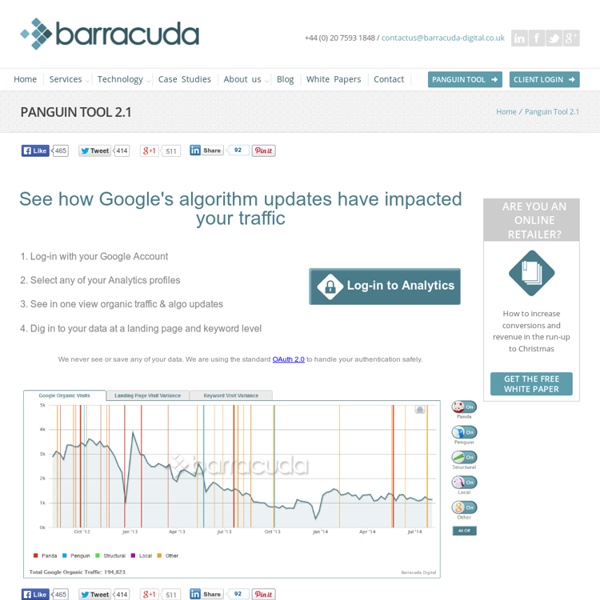



Google Analytics Official Website – Web Analytics & Reporting – Google Analytics Delivered on Google's world-class platform. Learn more Monitor activity as it happens on your site. So you'll immediately see what's working and what's not. Don’t rely on guesswork when it comes to your social media investment. See how your marketing channels work together to create sales and conversions.
50 Reasons Your Website Deserves to Be Penalized By Google Google’s on an uncompromising mission. It wants to give its users access to accurate information, unique content and the finest writers. It continually tweaks and improves its algorithms so that the best of the web gets the exposure it deserves. Unfortunately, there’s a flipside: a penalty. What Is a Google Penalty? Google has been changing its ranking algorithms since December 2000. Over the next decade-and-a-bit, Google continued to refine the quality of its search results. The Penguin update was rolled out in 2012. Recognizing a Penalty Penalties can be automatic or manual. For algorithmic penalties, here are some sure-fire clues. Your website is not ranking well for your brand name any more. If you see one or more of these factors, you can be pretty sure that a penalty has affected your site. Why Has Google Penalized My Site? Google is continually tweaking and revising the way it indexes content. Buying links. How to Deal With a Penalty Figured out the cause for your penalty? Don’t panic.
Links to Avoid in the Post Google Penguin Era (With Alternatives) In my previous posts, I shared post-panda/penguin era link acquisition strategies, un-common and powerful link building techniques, and advanced link building strategies. But, sometimes the best way to learn is by understanding what NOT to do, and especially in the post Google Penguin era. With this post, I would like to spread the word about links to avoid while executing your link building campaign, and mention some alternatives. Manipulative linking strategies leave footprints that can be detected and rooted out by humans and algorithms. While some manipulative link building strategies may still work, the reality is that they put your reputation at risk and are likely to result in penalties down the road. Avoid these strategies like the plague: 1. Purchased links can and do still work, but there are several reasons you should never buy a link anyway. – Purchased links are usually over-optimized, reside in the sidebar, and offer little value. Alternative: Offer value to site owners. 2.
The Delegator® AlgoSleuth Tool After weeks of tweaking, beta testing, and fine tuning our formulas we are happy to present the Delegator® AlgoSleuth Tool. AlgoSleuth harnesses the power of the Google Analytics API to provide a powerful analysis of your site’s organic traffic and highlights all major Google Algorithm updates that may have affected you over the past several years. The process for extracting your data takes, on average, just 2-3 minutes. After that, you can use AlgoSleuth to query results for one or any number of Google Analytics profiles. Current Version: v1.6 – Now updated for the new Panda 4.0 Algorithm! Because we know how important this data is for every SEO analyst, we want to help you extract it for free. The data tab of AlgoSleuth highlights the % change in traffic values 30 days prior to & 30 days following an algorithm update. The AlgoSleuth graph tab plots your site’s traffic over time against the major Google algorithm updates of the last 2+ years. Ready to see your site’s data?
17 Ways to Get De-indexed by Google Imagine this: In a blink of an eye your website vanishes from Google. Trying every variation of your domain name in the search box — but nothing. You, my friend, have been de-indexed from Google. That’s a tragic place to be in. All your hard work gone up in smoke, you are effectively invisible to everyone in the world now. This is exactly the spot that iAcquire found themselves in May 2012 when they were caught up in the Dun and Bradstreet link buying scandal. Never mind whether or not you agree with Google’s rules, and the punishment meted out, Google’s rules are the ones everyone has to play by. Now that we’re focused on the horror of “de-indexing”, unnatural link acquisition isn’t the only way to get banned by Google. 1. The cloaking process works like this: You show search engines one thing and your visitors something else. Cloaking is accomplished by delivering content based upon the IP address or the User-Agent HTTP. This practice is deceptive—and flat-out forbidden by Google. 2.
Smarter Internal Linking Hey there SEOmoz readers! This week we are talking about what I like to call "Smarter Internal Linking". Rand mentioned internal linking a few months ago before Penguin even hit, back when we were still calling it the "over-optimization penalty". A few months later, we can see the potential effects that Penguin has had and the factors causing them. So how can we be smarter in our internal linking? Howdy, SEOmoz fans.